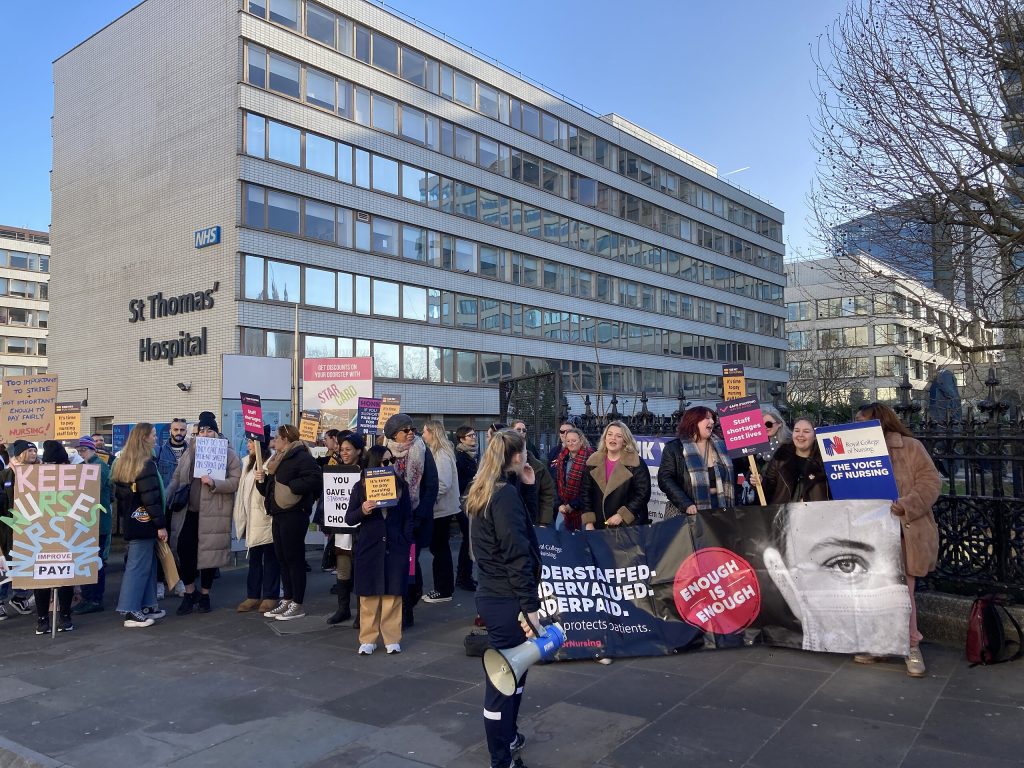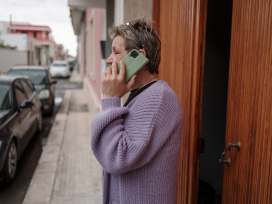The limits of altruism
Why careers in public health are losing their appeal
When flexible hours and remote working have become the norm, the public healthcare sector is struggling to retain workers who want a better work-life balance, better pay and less hierarchical workplaces. The system was not built with these demands in mind, write four French hospital directors.
Questions about the functioning of France’s health system are not new, but the nature of those questions is gradually changing. Although funding remains an important topic, questions about governance and the appeal of the public health sector have taken centre stage. The human resources crisis, which has been a major problem since summer 2021, is characterized by difficulties recruiting staff and a rise in absenteeism.1
The shortage of medical professionals is a global issue that is becoming increasingly critical, especially in countries where the demand for care is rising. The World Health Organization predicts a shortfall of 18 million medical professionals by 2030, primarily in the Global South. The crisis is the result of wide-reaching structural changes, and demands to be analysed in its entirety.
Our personal relationship with work is being transformed for reasons that go beyond generational renewal in the labour market. Employees are demanding greater recognition, especially financial, of individual achievements, and more flexibility in task management and working hours. This is causing headaches for all collective organizations, which are constantly called upon to be more agile.
Hospitals are also having to deal with major challenges, including an aging population, a rise in chronic diseases, and public health crises, without necessarily having a funding model that can accommodate social changes or the systemic effects of health crises.

Nurses protest in London, February 2023. Source: Wikimedia Commons (author: Matt Brown)
Disenchantment
The first change, which may seem paradoxical, is the increasing demand for ‘meaningful’ careers.2 Present in a wide range of sectors, the refusal of ‘bullshit jobs’3 might at first sight seem irrelevant in the health sector. We tend to associate care work with ‘vocation’ or ‘calling’, concepts which derive from its religious heritage. The public service nature of the work seems self-evident, combining individual self-sacrifice and the detachment of the care sector from the market economy. The ethos of appears to be an altruistic relationship to suffering and a twofold selflessness, both in terms of the care-giver’s own needs, which are deemed superficial compared to those of the patient, and in terms of financial recognition of the carer’s skills.
The appeal of medicine as a ‘useful’ profession is very much in evidence among students, whose enthusiasm for a career in health has not diminished. In France, the desire to ‘do medicine’ remains strong.Since the addition of nursing schools to the Parcoursup platform (matching students with places –ed.) in 2019, nursing has been the most popular course, requested by more than 100,000 young people.4
But the care ethos seems to be a double-edged sword, feeding not just students’ initial commitment but also their disappointment when working conditions encountered in practice do not always make it possible to provide ‘good enough’5 care, not to mention the guilt of occasionally mistreating people. Searching for alternative working conditions or changing career altogether seem like the only possible responses to this private ethical dilemma.
For almost thirty years, changes in society have fuelled changes in hospitals. The economic sphere has ‘embedded’ itself in the social sphere, rationalizing its finances and management via the notorious ‘T2A’ (tarification à l’activité, or service-based fees) and the new public management approach. Tighter control of health spending and the prioritization of profitable services have reshaped the healthcare landscape.
A Weberian logic of ‘disenchantment’ has gradually emerged in the sector as a result of the professionalization of every aspect of care, the proliferation of technical quality-control procedures, and the dominance of formal rationality over emotional bonds.6
While the immediate meaning and direct value provided by healing patients formerly served as an impregnable bulwark for the care professions, they are now confronted by compassion fatigue – in other words, the limits of altruism. Patients are no longer the only ones expressing their suffering.
The changes in people’s relationship to work, which began with the introduction of the 35-hour week, have undeniably been a positive development for care-givers: no longer can they be expected to be on call for 24 hours, sandwiched between two full working days. Nevertheless, progress has arrived late in a sector that remains the antithesis of the digitalized, fluid, and flexible tertiary industry, in which employees can alternate at will between working from home or in the office.
The remote working imposed on some health professionals during the pandemic was seen as a restriction, while the commitment of other workers was seen as heroic. Subsequent developments have seen some sectors gain a measure of flexibility, while others are still facing heavy work demands after a particularly difficult period.
New equilibriums, with hospital staff seeking part-time and weekday-only work schedules, are reducing available working time in a context where resources are already under pressure. When people talk about ‘quality of life at work’ or the balance between private and professional life, what they mean is: leaving work at a set time; not being summoned back from leave, even if to ensure continuity of care; unplanned absence; availability based on personal convenience; time out between finishing studies and starting work; not being on call after the age of 60; and so on. Though broadly legitimate, the hospital model in France was not built with these new behaviours in mind and is struggling to adapt.
Both the administrative structure and the professional culture of hospitals are segmented and very hierarchical. The complexity of care and the proliferation of sub-specialities demand concentrated governance in order to unify strategic management. Moreover, the round two hundred separate professions and their specific, often lengthy training trajectories make it natural to submit to verticality in all departments, whether medical (university professors, ‘mandarins’), paramedical (general care coordinators, care directors, senior management), or administrative, technical or logistical (hospital directors, administrative officers, engineers). The public hospital is thus still pretty much the opposite of the so-called ‘start-up nation’.
Students become aware of this cumbersome hierarchy during their first work placements, which is sometimes an extremely difficult experience, leading some to rule out ever working in a hospital. Others internalize and reproduce the same behaviours. Fundamentally the product of the values and ideologies of the health sector, hospitals are radically incompatible with some of the demands being expressed by wider society. The demand for horizontal interpersonal relationships undermines hierarchy, which in a complex professional environment such as a hospital is supposed to reflect high standards.
Multiple solutions
All measures to reduce the gap between the needs of the health system and the availability of professionals must be implemented simultaneously, rapidly and on a massive scale. Health systems must be oriented more towards prevention to halt the rise of chronic diseases; the number of trained professionals must be rapidly and substantially increased; and care-giving activities must be delegated to other, more numerous or more quickly trained professionals. If necessary, new professions must be created for this purpose.
Collective acceptance of the need to reorganize care. Progress in technical medicine and policies to rationalize health costs have led to public hospitals gradually moving away from primary care. But the withdrawal of the private sector to focus on better paid activities make it imperative for hospitals to offer primary care again. The COVID-19 crisis and the subsequent flu crisis in winter 2022–2023 were absorbed primarily by public hospitals, with major consequences for hospital teams (last-minute schedules or service changes).
This could lead to the deterioration of care provision in France, which until now has been the envy of many countries. We must recognize the scale of the problem and the need to reorganize care by cutting activities that use more human resources than can be justified. The most burdensome activities must also be allocated more fairly. Although these decisions may be politically difficult, they must be balanced with concerns for patient safety and the efficient use of professional resources.
Mobilization of society to make healthcare professionals’ lives easier. Making demanding, female-dominated professions more attractive requires the mobilization of society as a whole. It is unacceptable for hospital facilities not to have proper public transport links, including at atypical times. In some areas, particularly in cities, a lack of accommodation is a major hindrance to recruitment.
Measures were implemented very quickly during the initial phase of the COVID-19 crisis to mitigate the specific problems faced by healthcare workers, including the provision of childcare. Initiatives developed locally are needed to sustainably adapt the living environment and public services to the needs of people with heavy workloads, and to meet the constant demand for hospital staff.
Sensitive action on salaries. Most of the wage and status changes introduced by the Ségur de la santé package in 2020, as well as the increase in the pay scale, adhere to the principles of equality and apply identically to all professionals in a given category, regardless of their personal level of commitment or hardship. Although the result of negotiations between the state and social actors, they are inadequate to satisfy the youngest workers, who want an individualized, rapid and more meaningful salary progression.
The ongoing discussion about remuneration for more demanding work (night or weekend shifts, constant attendance, etc.) must take this into account. Equality is not fairness, and the level of hardship and burden are not identical in all roles or in all establishments. The public hospital service is currently at the crossroads of these paradoxes, as demonstrated by the rising number of contractors being hired, which calls the benefits historically attributed to tenure into question.
Reconciliation of the desire for flexibility with the need for stability. The recurring demand for a re-evaluation of the concept of public service, when it does not simply reflect a desire to return to a more ‘feudal’ model, responds to professionals’ need to go back to a work environment built on a human scale. COVID-19 and the rise of absenteeism have led to high levels of intra-establishment mobility among paramedical professionals, the difficultly of which is exacerbated because it is rarely accompanied by suitable training.
Because moving between disciplines is not a problem for all professionals – as shown by the popularity of temping – hospitals must identify workers who are more inclined to this type of work and train them to function accordingly. Simulation, serious games, and mentoring could all facilitate this change. It is difficult to make work schedules more flexible given the need for continuity of care and the variety of professionals’ needs. The introduction of the 12-hour shift illustrates the complexity of the challenge: there is a clear gap between the youngest workers, who want more days off, and the oldest, often most experienced staff, who want shorter workdays that are more compatible with family life.
Evolution of management approaches. All these paradoxes make managing a team an increasingly demanding job. Authority, or respect for the superior or ward supervisor, is not enough to satisfy the desire for meaning and fairness at work. This is especially the case in the medical sector, where the concepts of master and student, or prescribing doctor and subordinate – are deeply rooted, and where training barely touches, if at all, on team management. Most of those currently in positions of responsibility in the sector struggle to acknowledge and handle these changes.
When convinced of the need for change at all, directors tend to gradually and often timidly propose new training courses, coaching, or workshops for discussing best practices. This initial movement must be continued proactively and embodied at all levels. Changes to practices and exemplary day-to-day involvement can set standards for communities. Annual appraisals, the use of reconciliation and mediation, and charters governing fair scheduling are other ways to build and manage teams.
Most hospitals are still only in the early stages of this shift to more participatory management. The changes must be rapidly introduced into the initial training of all hospital professions. Inter-professional mixing in initial and further training would benefit these transformations.
Mobilization of the specific assets that make public hospitals attractive. Hospitals, especially university hospitals, remain centres of innovation and progress in the medical, paramedical, and management fields, but hospital staff do not all have access to research or are unable to devote as much time to it as they would wish. Pursuing the development of healthcare research, making sure that staff at university hospitals have time for research, and involving non-university hospitals in clinical research activities as part of regional hospital groups are all necessary measures both to maintain France’s status as a leader in medical research and to attract staff.
Finally, regarding the motivations that drive professionals to choose a career as a care-giver in a health institution, sufficient time must be set aside for high-quality, collective discussion of roles, particularly the most demanding. This could take the form of staff meetings, ethics consultations, peer groups or team supervision. These support mechanisms would give meaning to the violence of disease and death, and the hardships of an often-demanding job, turning medical work into a source of professional achievement and pride.
Public hospitals are facing real difficulties in attracting staff. The severity of these difficulties is linked not so much to their scale as to the fact that their causes are forbiddingly complex and require simultaneous, rapid action on a whole set of measures (regulatory, financial, managerial, organizational, and training). Only then will it be possible to thoroughly transform inter-professional relationships within the hospital. Making public hospitals attractive workplaces again does not mean returning to some hypothetical golden age: it means working together to identify and create the conditions for ‘caring well’ in the twenty-first century.

Published in cooperation with CAIRN International Edition, translated and edited by Cadenza Academic Translations.
Absenteeism (sick leave, maternity leave, long-term sickness, etc.) has increased significantly, from 7.4 per cent in 2012 to 9 per cent in 2019, stabilizing at 10 per cent in 2021. The difficulty of recruiting staff is reflected in the aggressive strategies currently being adopted by all hospitals (advertising campaigns, pre-hiring for students, combined work and retirement, offering the maximum compensation possible within the regulatory framework). This increase is especially steep given that hospital jobs increased on average by 3 per cent between 2019 and 2021. See Enquête FHF – Situation RH – avril-mai 2022 (online, Fédération hospitalière de France, June 2022).
In 2019, 37 per cent of employees, or just under 9 million people, felt they would be unable to continue doing the same job until they retired (retirement age at the time was 62). See Mikaël Beatriz, Quels facteurs influencent la capacité des salariés à faire le même travail jusqu’à la retraite? (online, Dares Analyses 17, March 2023).
David Graeber, Bullshit Jobs (New York: Simon & Schuster, 2018).
Stéphane Le Bouler, in collaboration with Emmanuel Touzé and Florence Girard, Parcoursup IFSI: pour rétablir quelques vérités (online, Laboratoire d’idées Santé Autonomie, 1 September 2022).
Yves Clot, with Jean-Yves Bonnefond, Antoine Bonnemain, and Mylène Zittoun, Le prix du travail bien fait. La coopération conflictuelle dans les organisations (Paris: La Découverte, 2021).
See Frédéric Spinhirny, Hôpital et modernité. Comprendre les nouvelles conditions de travail (Paris: Sens & Tonka, 2018).
Published 5 July 2023
Original in French
Translated by
Cadenza Academic Translations
First published by Esprit 498 (2023) (French version); Eurozine (English version)
Contributed by Esprit © Marie-Noëlle Gerain-Breuzard / Isabelle Richard / Alexandre Fournier / Frédéric Spinhirny / Esprit / Eurozine
PDF/PRINTPublished in
In collaboration with
Newsletter
Subscribe to know what’s worth thinking about.
Related Articles

Pilot schemes show that the four-day week can increase productivity while significantly improving personal wellbeing. So what is holding back this long mooted reform? Comparison shows that some models are more popular than others among employers and employees alike.

What happened to solidarity?
Fronesis 80–81 (2024)
Analyses of the decline of Scandinavian social democracy: how marketization has destroyed the Swedish model; on the rise of anti-elitist conservatism in Denmark; and dusting down the concept of the professional managerial class.





